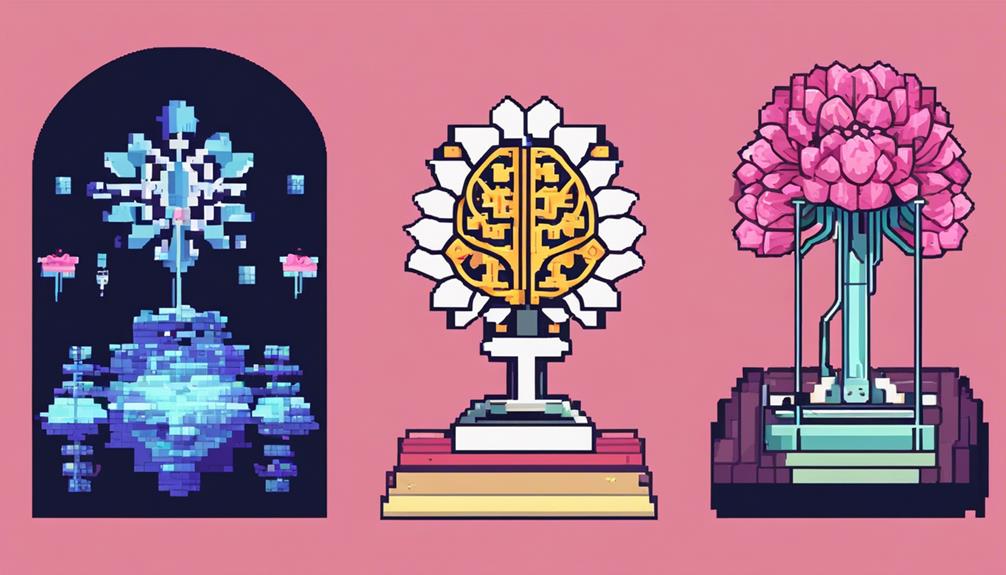You're probably wondering if personal development and self-improvement are just synonyms or distinct concepts. While they both aim to enhance yourself, they differ in focus. Personal development takes a holistic approach to growth, targeting overall well-being, whereas self-improvement zooms in on specific areas for refinement. Both require setting goals, overcoming obstacles, and aligning values and beliefs. By understanding their distinct approaches, you can tailor your efforts for desired growth. As you explore the nuances of personal development and self-improvement, you'll discover more about how to intentionally drive your growth journey forward.
Key Takeaways
- Personal development focuses on holistic growth, while self-improvement targets specific areas for enhancement, but both aim to increase self-awareness and skills.
- Both processes involve identifying areas for improvement, setting goals, and overcoming obstacles to achieve growth and success.
- Aligning core values and beliefs is crucial for both personal development and self-improvement, driving motivation and commitment in the growth journey.
- While distinct, personal development and self-improvement often overlap, as improving specific areas can contribute to overall personal growth.
- Understanding the differences and similarities between personal development and self-improvement helps tailor efforts for desired growth and improvement.
Understanding Personal Development
When you begin on a journey of personal development, you're basically holding up a mirror to your inner self, ready to confront, refine, and elevate your thoughts, feelings, and actions to reveal your full potential.
This process involves looking inward to enhance your self-awareness, self-esteem, skills, and aspirations. It's a form of Inner Work that focuses on achieving purpose and clarity in life.
Personal development encompasses all aspects of life for holistic growth, targeting key areas such as mental, social, spiritual, emotional, and physical development. As you engage in this journey, you'll experience increased self-awareness, mental fitness, and problem-solving skills, ultimately leading to personal growth.
By understanding personal development, you'll be better equipped to make intentional decisions that align with your values and goals. While often used interchangeably with self-improvement, personal development has a unique focus on internal growth and self-awareness.
Defining Self-Improvement

You start on a self-improvement journey by identifying specific areas in your life that need refinement, and then setting concrete goals to tackle them head-on. This process is all about making deliberate changes to enhance yourself, whether it's improving your skills, habits, or behaviors.
By setting goals and taking targeted actions, you're taking control of your personal growth. The focus of self-improvement is on achieving tangible improvements in various areas, which reflects the process of growing and evolving as an individual.
It's not about making sweeping changes or trying to overhaul your entire life; it's about making intentional, incremental improvements that add up over time. As you work on self-improvement, you'll find that you're becoming a better version of yourself, one step at a time.
Key Areas of Focus

As you begin your self-improvement journey, it's essential to identify and prioritize the key areas that require attention and refinement. This involves recognizing the specific aspects of your life that need improvement, such as your career, relationships, physical health, or mental well-being. By pinpointing these areas, you can focus your efforts on making targeted changes that will have a significant impact.
In contrast, personal development takes a more holistic approach, encompassing overall growth in various life areas. While self-improvement focuses on refining specific skills or habits, personal development involves continuous learning and self-discovery.
As you focus on self-improvement, you'll concentrate on developing strategies for overcoming obstacles and achieving tangible results. By identifying and addressing these key areas, you'll be able to make meaningful progress and improvements in your life. By understanding the distinct approaches of personal development and self-improvement, you can tailor your efforts to achieve the growth and progress you desire.
Goals and Values Alignment

When you're working on personal development and self-improvement, you'll want to guarantee your goals and values are in sync.
This means you'll need to align your core values, set life objectives that truly matter to you, and prioritize personal goals that drive meaningful progress.
Aligning Core Values
One crucial aspect of personal development is understanding that your goals and values must be in perfect harmony, which is why aligning core values is crucial for a fulfilling journey.
You need to make sure that your actions and goals are in line with your fundamental beliefs and principles. This requires introspection and reflection to identify what truly matters to you and how you can align your behaviors and decisions accordingly.
When you achieve this harmony, you're more likely to experience fulfillment, motivation, and a sense of purpose in your personal growth journey.
On the other hand, misalignment between goals and values can lead to inner conflict, dissatisfaction, and a lack of direction in pursuing self-improvement efforts.
Setting Life Objectives
You're now ready to take the next step in your personal development journey by setting life objectives that align your goals with your core values, a process that allows you to create a clear roadmap for meaningful growth and lasting fulfillment. This involves identifying specific, measurable goals that resonate with your values and aspirations. By doing so, you'll secure a sense of purpose and direction in your personal development.
Here's a breakdown of what this process looks like:
| Goals | Values Alignment | Benefits |
|---|---|---|
| Career Advancement | Professional growth, financial security | Sense of accomplishment, increased confidence |
| Healthy Habits | Well-being, self-care | Improved physical and mental health |
| Meaningful Relationships | Emotional connection, empathy | Stronger bonds, support system |
| Personal Growth | Self-awareness, learning | Increased self-awareness, skill development |
| Financial Security | Stability, freedom | Reduced stress, increased peace of mind |
Prioritizing Personal Goals
By evaluating which personal goals align most closely with your core values, you can create a clear hierarchy of objectives that will drive your motivation and commitment to achieving them. This is because setting goals that resonate with your values can lead to a sense of purpose and fulfillment.
When you prioritize personal goals based on your values, you'll be more likely to stay committed to achieving them. This alignment also helps you make decisions that are in line with your authentic self, leading to a more authentic and fulfilling life.
As you prioritize your goals, ask yourself which ones align most closely with your core values. Then, focus on the top goals that will have the greatest impact on your personal growth. By doing so, you'll experience a greater sense of fulfillment and satisfaction as you work towards achieving your goals.
The Role of Process and System

As you work on your personal development and self-improvement, you'll find that having a systematic approach matters.
You'll need to establish daily routines that drive growth and support your goals.
Systematic Approach Matters
Having a systematic approach in place enables you to methodically tackle personal development, allowing for a more efficient use of time and resources. This approach emphasizes the process of growth and improvement over time, ensuring you stay consistent in your development efforts. A well-defined process breaks down personal development goals into actionable steps, making them easier to implement. With a system in place, you can set priorities, manage your time effectively, and achieve desired outcomes.
Moreover, a systematic approach provides a framework for tracking your progress, identifying areas that need improvement, and making adjustments accordingly. It creates a supportive environment that fosters continuous learning and advancement. By having a structured system, you'll be better equipped to handle setbacks and stay motivated. Your personal development journey will become more focused, and you'll be able to celebrate small wins along the way.
Daily Routines Drive Growth
You commit to daily routines that drive growth when you prioritize process and system, recognizing that consistent execution is key to achieving your personal development goals. By doing so, you provide structure and consistency in your growth, allowing you to make progress towards your objectives.
The role of process in your daily routines involves following systematic steps and methods to achieve desired outcomes. Having a well-defined system in place assures that you're taking small, incremental steps towards your goals every day.
Consistency is key to success in personal development, as small daily actions contribute to significant long-term growth. Your daily routines serve as a foundation for personal growth, helping you stay focused and committed to your self-improvement journey.
Key to Achieving Goals
By incorporating process and system into your daily routines, you've set yourself up for success, and now it's time to explore how these elements serve as the key to achieving your personal development goals.
A process provides a structured approach to development, making sure you're taking deliberate steps towards growth. A system, on the other hand, organizes these steps, supporting continuous learning and improvement.
Together, process and system facilitate progress and guarantee the effectiveness of your personal development efforts. Here are four ways they help you achieve your goals:
- Clear direction: A process provides a clear roadmap for achieving your goals, helping you stay focused and motivated.
- Consistency: A system guarantees consistency in your improvement efforts, even when faced with obstacles or setbacks.
- Efficient use of time: By organizing your steps, a system helps you make the most of your time, maximizing your progress towards your goals.
- Measurable progress: A process and system enable you to track your progress, making it easier to identify areas for improvement and celebrate your successes.
Science and Application of Growth

Research in psychology and neuroscience has shed light on the underlying mechanisms of personal growth, revealing that intentional self-reflection and strategic goal-setting can catalyze profound transformations in behavior, cognition, and emotional regulation.
You can harness this knowledge to fuel your growth, whether you're focused on personal development or self-improvement. By understanding how your brain processes information and responds to challenges, you can develop targeted strategies to overcome obstacles and achieve your goals.
For instance, you can use neuroplasticity to rewire your brain and build new habits, or leverage the power of positive self-talk to boost your confidence and motivation. Additionally, you can apply evidence-based techniques, such as mindfulness and cognitive-behavioral therapy, to cultivate emotional intelligence and resilience.
Personal Development Vs Self-Improvement

While the terms 'personal growth' and 'self-enhancement' are often used interchangeably, they've distinct approaches and focuses that set them apart. You might be wondering what exactly sets them apart. Let's delve into.
Key differences:
- Scope: Personal growth takes a holistic approach, encompassing various life areas, whereas self-enhancement targets specific areas needing refinement.
- Focus: Personal growth aims to enhance self-awareness and self-discovery, while self-enhancement focuses on achieving specific outcomes through targeted actions.
- Goals: Personal growth involves continuous learning and skill-building, whereas self-enhancement involves setting goals and taking action steps for change.
- Approach: Personal growth is broader in scope, involving a more general approach, whereas self-enhancement is more focused on achieving specific outcomes.
As you explore your own progress, it's crucial to understand these differences. By recognizing the unique aspects of personal growth and self-enhancement, you can tailor your approach to suit your individual needs and goals.
Universally Useful Concepts

You can harness the power of universally useful concepts, such as goals, values, and belief systems, to propel your personal growth and self-improvement journey forward. These concepts form the foundation for self-improvement and growth in various life areas. By understanding and applying them, you can experience personal transformation and fulfillment. They serve as guiding principles for achieving personal goals and continuous improvement.
Incorporating universally useful concepts into your daily practices can contribute to overall well-being and success. Goals help you focus on what you want to achieve, while values guide your decision-making process. Belief systems, on the other hand, shape your mindset and attitude towards challenges.
Additionally, success keys and proper belief systems for success provide you with the necessary tools to overcome obstacles and stay motivated. By leveraging these concepts, you'll be better equipped to navigate life's challenges and make progress towards your desired outcomes.
Importance of Focusing on Growth

By dedicating yourself to personal growth, you'll access a wealth of benefits that extend far beyond mere self-improvement, transforming every aspect of your life. When you focus on growth, you'll develop enhanced skills, knowledge, and capabilities, allowing you to tackle challenges with confidence. This, in turn, helps you build resilience and adapt to various situations, leading to increased self-awareness and overall well-being.
Here are just a few of the benefits you can expect from prioritizing personal growth:
- Improved relationships: As you grow, you'll become a more empathetic, understanding, and supportive partner, friend, and family member.
- Career advancement: Continued growth will equip you with the skills and motivation needed to take your career to the next level.
- Increased confidence: By focusing on growth, you'll develop a stronger sense of self, leading to increased confidence and a more positive mindset.
- Personal fulfillment: Embracing growth opportunities will lead to a greater sense of purpose and fulfillment, allowing you to live a more meaningful life.
Characteristics of Personal Development

Personal development's core characteristics are rooted in its focus on continuous growth, self-awareness, and improvement across various aspects of life.
As you commence on this journey, you'll find that it encompasses a holistic approach to individual well-being and growth.
You'll focus on overall growth and advancement in areas like career, relationships, and personal goals.
This process involves continuous learning and skill-building to enhance your self-awareness and self-discovery.
Frequently Asked Questions
Are Self-Improvement and Personal Development the Same Thing?
You wonder if self-improvement and personal development are the same thing. While they share similar goals, they differ in scope and approach. Self-improvement targets specific areas, whereas personal development encompasses growth in various life aspects.
What Is a Synonym for Personal Development?
You're probably familiar with the story of Oprah Winfrey's transformative journey; well, her growth is a prime example of personal development. As you explore this concept, you'll find that self-growth is a fitting synonym for personal development, reflecting individual progress and improvement.
What Is the Difference Between Improvement and Development?
You focus on making specific changes with improvement, whereas development involves a broader scope of growth in various life areas, emphasizing continuous learning and self-awareness, leading to a more holistic approach to personal growth.
What's Another Way of Saying Self-Improvement?
You're on a quest for self-improvement, and you're wondering what else to call it. Think of it as polishing a gem – you're refining your inner sparkle. You could also call it self-growth, self-empowerment, self-actualization, or self-realization, but the goal remains the same: revealing your full potential.
Are Personal Development and Self-Improvement Interchangeable Terms?
Some individuals may use the terms personal development and self-improvement interchangeably, but there is a linguistic dilemma: selfimprovement word. While they both involve growth and progress, personal development often encompasses a broader range of areas such as relationships, career, and personal goals, whereas self-improvement focuses more on individual’s actions and habits.
Is There a Difference Between Personal Development and Self-Improvement or are they Synonyms?
Many people often struggle with the linguistic dilemma: selfimprovement word. While personal development and self-improvement are often used interchangeably, there are subtle differences. Personal development focuses on overall growth and fulfillment, while self-improvement specifically targets areas for enhancement. So, while related, they are not exact synonyms.
Conclusion
As you navigate the journey of personal growth, remember that personal development and self-improvement are two sides of the same coin.
While distinct, they're intertwined, like threads in a tapestry. Personal development weaves together the fabric of your being, strengthening your character and values.
Self-improvement polishes the threads, refining your skills and habits. Together, they form a rich brocade, empowering you to become the best version of yourself.









